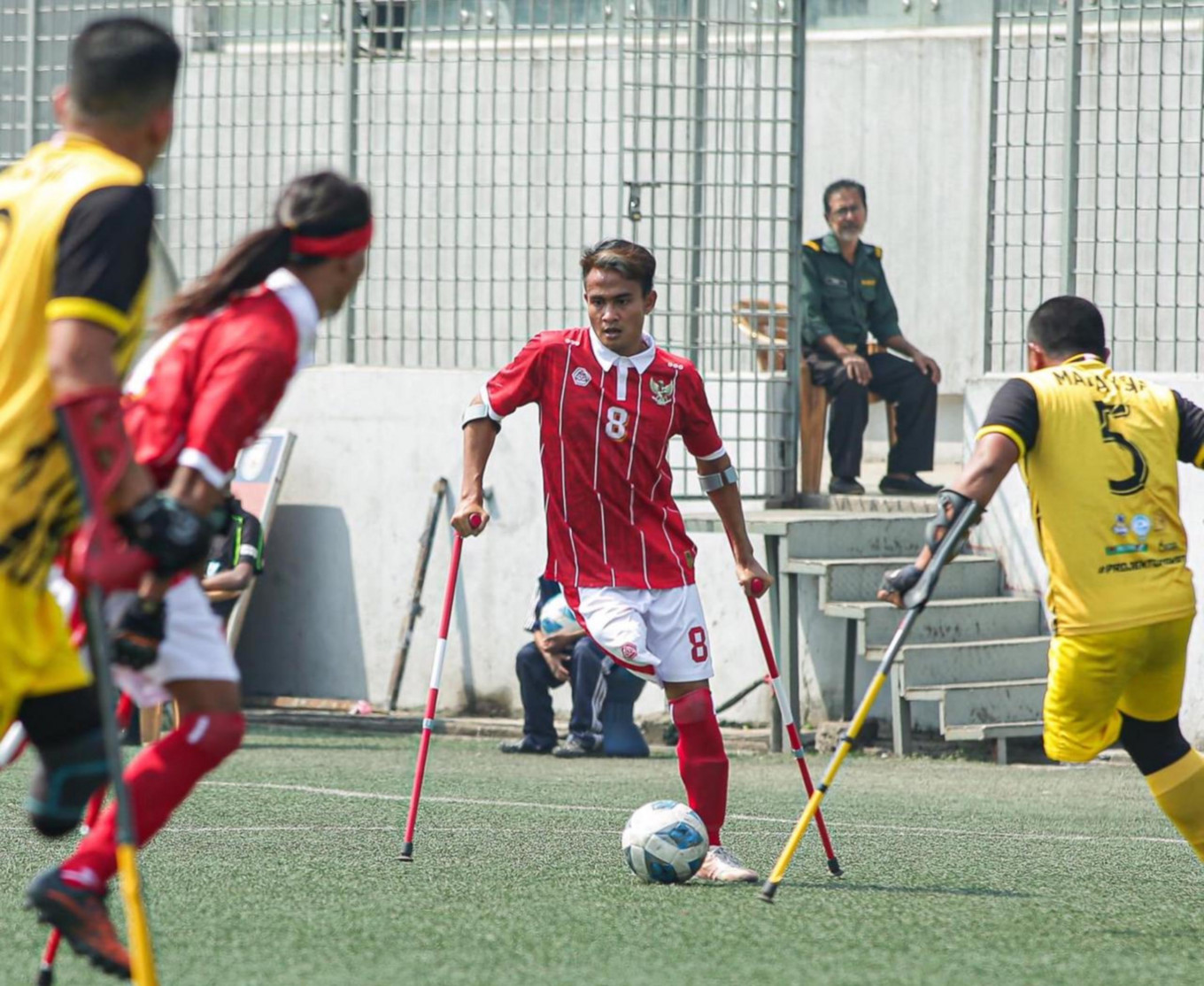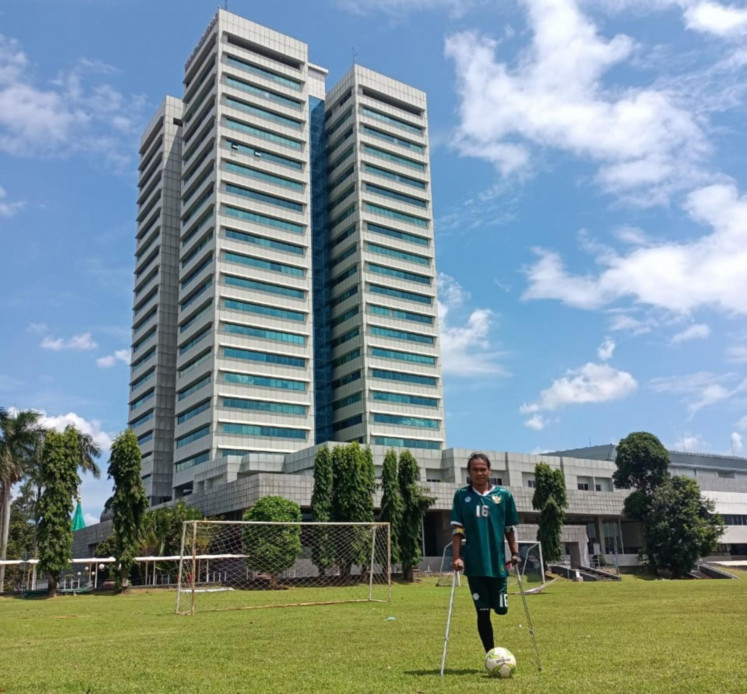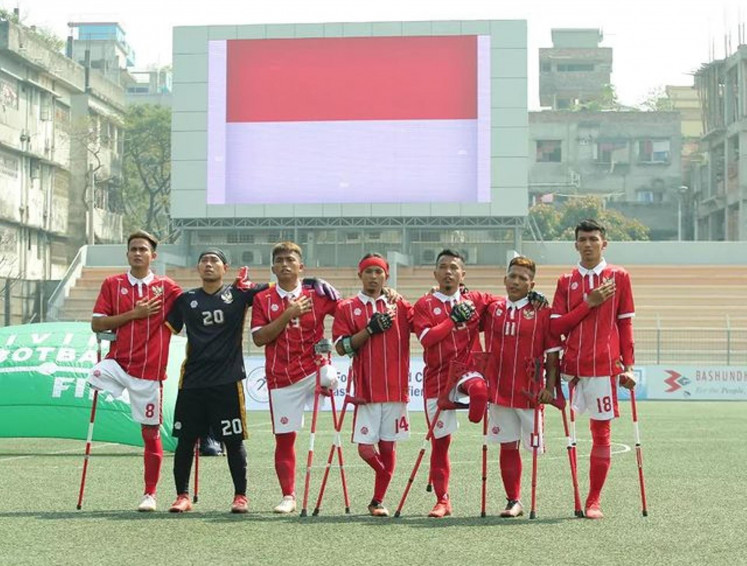Popular Reads
Top Results
Can't find what you're looking for?
View all search resultsPopular Reads
Top Results
Can't find what you're looking for?
View all search resultsINAF: National amputee soccer team helps players live their dreams
Change text size
Gift Premium Articles
to Anyone
 Unstoppable: Indonesian Amputee Football Association (INAF) captain and midfielder Aditya (center) shows his prowess on the field during the 2022 Amputee Soccer World Cup East Asia Qualifer match against Malaysia on March 13 in Dhaka, Bangladesh. INAF won 3-0 to advance to its final qualifier match against Japan on March 14. (Courtesy of INAF) (Courtesy of INAF/Courtesy of INAF)
Unstoppable: Indonesian Amputee Football Association (INAF) captain and midfielder Aditya (center) shows his prowess on the field during the 2022 Amputee Soccer World Cup East Asia Qualifer match against Malaysia on March 13 in Dhaka, Bangladesh. INAF won 3-0 to advance to its final qualifier match against Japan on March 14. (Courtesy of INAF) (Courtesy of INAF/Courtesy of INAF)
T
he Indonesian Amputee Football Association has finished runner-up in its debut outing at the East Asia Qualifer, despite serious underfunding. It is now gearing up to head to the 2022 Amputee Soccer World Cup in Turkey – hopefully with the support of the government, generous donors and fans.
Soccer has been an important part of Aditya’s life, ever since he was a child. He aspires to be as good as Argentinian superstar Lionel Messi one day.
Combined with his desire to be playing regular matches, his dream prompted him to enroll in Bandung’s Saint Prima Football Academy back in 2012.
“I was motivated [to enroll at Saint Prima] because when I was a junior high school student, I watched my friends participating in tournaments alongside clubs in Bandung,” he said on March 23.
In 2014, Aditya attended a training camp for under 17s (U-17) organized by the Persib Bandung soccer club.
A year later, when world governing body FIFA suspended Indonesia from international competition and the national league ground to a halt, Aditya decided to study at Sunan Gunung Djati State Islamic University, Bandung (UIN Bandung). But he could not stop playing soccer, so he took part in various university tournaments.
Tragedy struck in 2017, when he fractured his right leg after colliding with the opposing goalkeeper during a friendly match. He was unable to seek immediate treatment for his injury, which ended up costing him his right leg.
“In 2018, I finally went to Hasan Sadikin hospital. That year, I was not ready to have my leg amputated. After spending one year at home, I finally decided to get my leg amputated in 2019,” recalled Aditya.
Now 24, Aditya is captain and midfielder of the Indonesia Amputee Football Association (INAF). In mid-March, the team came second at the East Asia Qualifier in Bangladesh, India, earning a place at the 2022 Amputee Soccer World Cup in October in Turkey.
Muhammad “Luki” Lukiyono is another player who helped the squad secure a spot at the World Cup. Luki was inspired to play soccer by his father and brothers, who used to participate in tarkam, or inter-village soccer tournaments, in Jember, East Java.
Luki was born without a left leg, but this did not discourage him from playing soccer with people who had two legs.
“Before I learned about amputee soccer, I played soccer by jumping on one leg, but I didn’t use crutches. I found it difficult to dribble the ball and run past my opponents,” said the 25-year-old striker.
Bright future: Muhammad "Luki" Lukiyono poses on a soccer field near the Senayan legislative complex in Jakarta. (Courtesy of INAF) (Courtesy of INAF/Courtesy of INAF)New beginnings
INAF was founded in March 2018 to accommodate amputees who were passionate about playing soccer. Cofounder and deputy chair Junaidi Abdillah said the idea to establish the association was born three years earlier.
“We had been planning to form this association since 2015. I searched for any information about amputee soccer teams, and it turned out that none existed [in Indonesia],” said the 32-year-old goalkeeper, who lost his right arm to amputation due to inadequate treatment following a fracture caused by a fall.
“I joined several groups for people with disabilities on social media, inviting them to join us,” he added.
Three months after its establishment, INAF was invited to participate in a friendly tournament in Malaysia. However, the team could only play one match because it was not registered with the World Amputee Football Federation (WAFF) at the time.
"We started participating officially at the 2022 World Cup qualifiers, as we just became a permanent member of the WAFF in 2020," said Junaidi. He explained that, to become a permanent WAFF member, an amputee soccer team needed recognition from the national soccer federation and must be registered as a legal entity.
Aditya’s journey to becoming an amputee soccer player was not always smooth. Before he decided to continue pursuing his dream, he needed time to think.
"At first, I looked for information about other sports like para swimming and sitting volleyball. But I felt that these sports were not suited to me," said Aditya, who became part of the INAF squad in 2019.
“I became interested [in amputee soccer] because it proves that it’s possible to play [soccer] using crutches,” he said. After finding a large amount of information about amputee soccer in Indonesia, he decided to contact INAF and sign up for its training camp.
Before his first training session, he tried playing on crutches in his yard and at a neighborhood soccer field, and found out that it was no walk in the park.
Meanwhile, Luki had been playing with the Jember Amputee Football Association (Persaid) team since 2019.
“A friend invited me to try playing on crutches. At first, I was confused because I had never done that before. In the early days, I often fell down,” said Luki, who was called up to join the INAF squad for the World Cup qualifiers through a selection process.
Training challenges
Prior to the World Cup qualifiers, the INAF team planned to play in the 2020 Asian Amputee Football Championship, but it was canceled because of COVID-19. Faced with the dearth of international tournaments, the team had to make the most of every match it played against local clubs before it headed to Bangladesh.
The lack of international tournaments was not its only challenge, as the team also faced insufficient funding. INAF is an informal organization run by volunteers, so its managers, coaches and players have to juggle between their responsibilities to the team and their professional or academic careers.
"We didn’t expect much from the government. We tried to raise money through [crowdfunding site] Kitabisa.com, but didn't meet our target. We also wrote letters asking for financial support [to various institutions],” said Junaidi.
During their World Cup training in Jakarta, the players stayed at the home of INAF secretary-general Rusharmanto Sutomo and used their private vehicles to get to the training site.
"In the first two weeks, we drove [our] motorcycles to get to the soccer field. Thank God, we finally received a donation for a bus in the last week of training," said Aditya.
Even though some institutions provided space so the players could train, the team practiced on different fields each week.
Another factor was the weather, owing to the prolonged rainy season this year.
“The Jakarta Youth and Sports Office facilitated our training at Srengseng field. Once we got there, we couldn’t use it because it was still wet from the rain. In the end, we went home," said Junaidi.
Fortunately, just before the team was due to depart for Bangladesh, several individuals donated money to cover their accommodation and airfare. A sportswear brand also donated T-shirts and shorts.
Junaidi said the team had campaigned to convince potential donors that it would qualify for the World Cup. “I saw that the players had high confidence, were excited and keen to prove that they could do this," he said.
And they proved themselves right: On March 14, INAF finished as runner-ups in its final match against Japan with a score of 0-2, the team’s first and only loss during the East Asia Qualifier.
National triumph: Players of the Indonesian Amputee Football Association (INAF) salute the Indonesian national anthem before kickoff at an East Asia Qualifier match in Dhaka, Bangladesh. INAF finished runner-up in the qualifier after a 0-2 first-time loss to Japan to earn a spot at the 2022 Amputee Soccer World Cup, to be held in October in Turkey. (Courtesy of INAF) (Courtesy of INAF/Courtesy of INAF)Light ahead
On the team’s triumphant return to Indonesia, it was met with an opportunity that seemed to spell hope for the final leg of INAF’s journey to the World Cup.
“After arriving in Indonesia, we were received by the Youth and Sports Minister. We told him about the things that needed to be prepared. What is certain is that we raised the issue of our players’ needs and the need for a training facility,” said Junaidi.
Meanwhile, amputee soccer is growing more prominent across the country as new players emerge in the regions.
“In Malang [East Java], for example, there’s already an amputee soccer club. We’re also looking to see if we can recruit new players to join the national team,” said Junaidi, saying that new players would mean positive competition among teammates.
He added that INAF was setting its sights on finishing in the top 10 at the 2022 World Cup and that this was a realistic goal, considering that the team was relatively new and inexperienced.
"Japan has experience playing in the World Cup. Meanwhile, we’ve only just qualified for the tournament," said Aditya.
Pursuing a career as an amputee soccer player doesn’t promise any financial rewards, but the sport has completely changed the players’ lives, offering them a channel to triumph over life’s challenges.
"My life is better because I’ve met friends who have gone through similar struggles, and we can fight [compete] together," said Luki.
“Through amputee soccer, those who dreamed of becoming [professional] players but [met with tragedy] can play and laugh again. It channels their passion," said Aditya.












